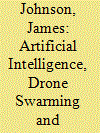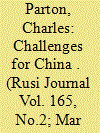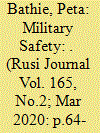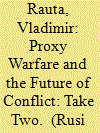| Srl | Item |
| 1 |
ID:
173319


|
|
|
|
|
| Summary/Abstract |
The rapid proliferation of a new generation of artificial intelligence (AI)-augmented and -enabled autonomous weapon systems (AWS), most notably drones used in swarming tactics, could have a significant impact on deterrence, nuclear security, escalation and strategic stability in future warfare. James Johnson argues that emerging iterations of AWS fused with AI systems will presage a powerful interplay of increased range, accuracy, mass, coordination, intelligence and speed in a future conflict. In turn, the risk of escalatory use-them-or-lose-them situations between nuclear-armed military powers and the attendant dangers posed by the use of unreliable, unverified and unsafe AWS will increase, with potentially catastrophic strategic outcomes.
|
|
|
|
|
|
|
|
|
|
|
|
|
|
|
|
| 2 |
ID:
173318


|
|
|
|
|
| Summary/Abstract |
The next few years may see the high tide of China’s power. Charles Parton highlights significant domestic challenges which the country will confront, and which may combine with an unfavourable international environment to make the Communist Party’s ambitions unaffordable and unreachable. Parton argues that breakthrough reforms are making slow progress, while President Xi Jinping is imposing a system of governance stripped of past flexibility, and relations with the West will be brittle.
|
|
|
|
|
|
|
|
|
|
|
|
|
|
|
|
| 3 |
ID:
173323


|
|
|
|
|
| Summary/Abstract |
Lariam is an antimalarial drug that has a safety profile characterised by a predominance of neuropsychiatric adverse reactions. It is still prescribed within the British armed forces. A purposive survey (n = 28) of serving and ex-serving British military personnel with experience of operations where Lariam was used revealed that 82% experienced side effects and 85.71% considered the drug unsuitable for use during military operations. An additional online survey (n = 50) provided supporting results. Using system theory analysis, Peta Bathie argues that Lariam use degrades decision-making, damages unit morale and erodes cohesiveness. Because it undermines fighting power, the consumption of such antimalarials appears inconsistent with current UK military doctrine.
|
|
|
|
|
|
|
|
|
|
|
|
|
|
|
|
| 4 |
ID:
173321


|
|
|
|
|
| Summary/Abstract |
The continuing occurrence of state-sponsored cyber attacks against liberal democracies, including private sector and civil society targets, shows that deterrence efforts have been less than successful. Elisabeth Braw and Gary Brown argue that adversary governments’ practice of hiding behind proxies makes response and thus deterrence extraordinarily difficult. As a deterrence strategy adding to the existing deterrence directed against hostile actors, they propose ‘personalised deterrence’, with governments of targeted countries communicating directly to individual cyber attackers their intent to hold them personally responsible through denial of benefits and use of criminal law.
|
|
|
|
|
|
|
|
|
|
|
|
|
|
|
|
| 5 |
ID:
173320


|
|
|
|
|
| Summary/Abstract |
While proxy wars have been around since time immemorial, the last decade of conflict has seen a rise in their strategic appeal. In the same way that sub-state violence captured the attention of policymakers and academics at the end of the Cold War, proxy wars are now a core feature of the contemporary and future strategic and security environment. Vladimir Rauta argues for a relocation of proxy wars by conceptualising them as strategic bargains waged on more complex grounds than risk avoidance, cost efficiency and deniability. He identifies two types of strategic goals sought through the employment of proxies: coercing and coping with an adversary, the differences of which are presented by contrasting the rationale for the US decision to support Syrian rebels against President Bashar Al-Assad with the Iranian strategy of proxy war in Syria.
|
|
|
|
|
|
|
|
|
|
|
|
|
|
|
|
| 6 |
ID:
173322


|
|
|
|
|
| Summary/Abstract |
The UK launch of ‘The Fusion Doctrine’ in 2018 was a major event in the history of joined-up government. It diagnosed changes to the national security arena, principally the distributed nature of non-traditional threats and their responses, offering a way to promote best practice in strategy-making and implementation – all while placing a spotlight on cross-functional teams, accountability and annual review. Yet it is difficult to implement whole-of-government approaches outside of times of crisis to address longstanding subjects. Joe Fossey suggests that space may be an opportunity to develop Fusion practice, focus government departments to pool and direct resources, and organise Fusion doctrine for the long term.
|
|
|
|
|
|
|
|
|
|
|
|
|
|
|
|
| 7 |
ID:
173324


|
|
|
|
|
| Summary/Abstract |
This article considers the ways social media platforms and behaviours have changed and continue to change war writing practices. Alisa Miller briefly considers the positive and negative contexts in which much online self-narrating and documentation of war experience now occurs. She questions the roles marketing and commercialisation play in supporting and sometimes limiting nuanced dialogue, and discusses some examples of earlier incarnations of online war writing: the blog.
|
|
|
|
|
|
|
|
|
|
|
|
|
|
|
|